
James Bond, the cultural phenomenon - a reading list
With the creation of James Bond, author Ian Fleming laid the foundation for a sprawling media franchise. Since the first novel appeared in 1953, Bond has appeared in books, movies, comic strips, video games and countless other media. On September 30, the twenty-fifth instalment of the film series, 'No Time to Die', will be released. Only the latest in a franchise that has become a cultural phenomenon.
As James Bond turned into a cultural icon, researchers have set out to explain Bond’s appeal and influence. What is the meaning of the Bond girls, the gadgets, and the (often foreign) megalomaniacs who want to take over the world? And why have these aspects of the Bond universe become so popular?
The Leiden University Libraries (UBL) holds a large collection of academic works and analyses of the James Bond phenomenon, as well as biographies of Bond’s creator Ian Fleming.
All books in the list below come from the collections of the UBL but are only a selection of the many books that the UBL owns on this subject. Every book is available for loan by following the link under the title or by searching our Catalogue.
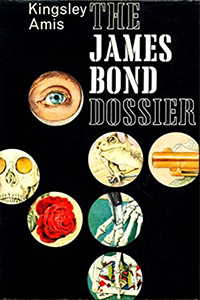
Kingsley Amis, The James Bond dossier
1965
Published less than a year after the death of Bond’s creator, Ian Fleming, Kingsley Amis’s work is one of the first to seriously analyse the Bond novels, their structure, and motives. Amis was just about the perfect person to do so, as he was both a novelist, a literary critic and an academic. His plea, to appreciate Fleming’s popular writings on their own terms rather than dismissing them as less-than-literary, laid the foundation for many later analyses of Fleming’s works. The work becomes even more interesting when you realize that Amis was also the first to take a shot at writing a Bond novel after Fleming. His novel, Colonel Sun (1966), is considered by many as one of the best Bond novels written after Fleming’s passing.
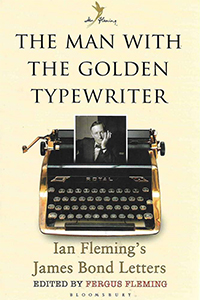
The Man with the Golden Typewriter: Ian Fleming's James Bond Letters
2016
Ian Fleming’s life has been documented in numerous biographies, but one of the best ways to get to know the creator of James Bond properly is through his letters. Fleming’s nephew Fergus selected letters from Fleming’s estate and organized them chronologically, with each section focusing on one particular Bond novel. The book is a treasure-trove for Fleming anecdotes. To mention just one: Fleming indeed had a gold-plated Royal typewriter. He bought it to celebrate the completion of the first Bond novel, Casino Royale. Through the letters, Fleming comes across as a much more sympathetic person than is often assumed. Furthermore, the letters highlight the distance between Fleming-the-author and Bond-the-character. There is also much room for the doubts that Fleming had about his creation. In one of his letters, Fleming states: “If one has a grain of intelligence it is difficult to go on being serious about a character like James Bond.”
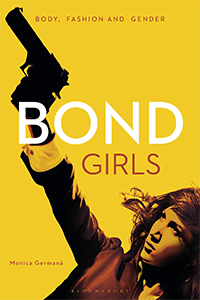
Monica Germanà, Bond Girls: Body, Fashion and Gender
2020
Both Ian Fleming and James Bond have been criticized for being male chauvinists. Indeed, women regularly feature as damsels in distress or mere screens for sexual objectification. The Bond phenomenon cannot be analysed without taking gender into account. Even more so, several authors have argued that it is possible to read Bond books and films differently, as challenging traditional gender roles. Germanà analyses how the physiques and clothing of Bond characters are portrayed and holds that: “a close reading of fashion – and the structures of its consumption – encourages a more nuanced – and subversive – view of the Bond Girl continuum.”
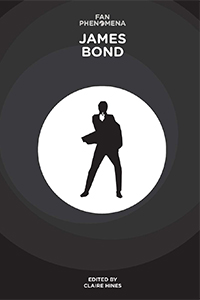
Claire Hines (ed.), Fan Phenomena: James Bond
2015
How many Bond fans does it take to change a lightbulb? One. But 10 to complain how much better the original was. The joke by Ajay Chowdhury, spokesperson for the James Bond international fan club, illustrates the intense emotions and commitment that James Bond has generated among fans. The different ways in which they have approached, appreciated, and appropriated Bond over the past sixty years are analysed in this volume. It is edited by Claire Hines, author of The Playboy and James Bond, and tackles topics such as fans who make their own Bond edits, design their own Bond fashion or more generally try to live the Bond lifestyle. What emerges is a multifaceted and intricate understanding of what drives James Bond’s biggest fans.

Edward Comentale et al (eds.), Ian Fleming and James Bond: The cultural politics of 007
2005
Cultural expressions such as James Bond films are not simply innocent cultural products. Rather, they reflect and mould cultural and political attitudes on matters such as gender, race, geopolitics, and technology. The Bond films always had a knack for using tongue-in-cheek humour as a device to both use and parody these attitudes. The volume edited by Edward Comentale and colleagues unpacks the various ways in which the Bond books make politics out of cultural issues. The chapters of this volume discuss topics such as Bond’s Britishness, Fleming and modernism, homosexual panic, and the James Bond lifestyle.
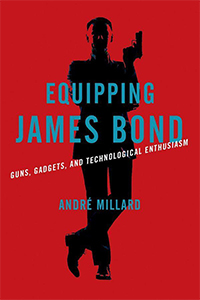
André Millard, Equipping James Bond: Guns, Gadgets, and Technological Enthusiasm
2018
While Fleming’s books featured little technological ‘gadgets’, the Bond films would turn such gimmicks into a core aspect of the Bond franchise. The cinematic Bond relies heavily on electronics to battle his foes, while his enemies use technologies such as nuclear weapons, computer networks and ‘space lasers’ to hold the world hostage. Technological development has become, at the same time, life-saving, life-threatening and an inherent aspect of modern life. In Equipping James Bond, Millard analyses the ambivalent stance towards technology in Fleming’s thinking, his books, and the subsequent Bond films. Moreover, he places this story in a larger history of espionage and popular perceptions of technological development.
Contact your faculty liaison
Is a book missing on this list, or would you like UBL to purchase a book about the cultural impact of Ian Fleming and James Bond that is not yet available in our collections? Contact your faculty liaison.
